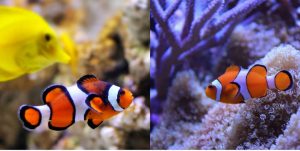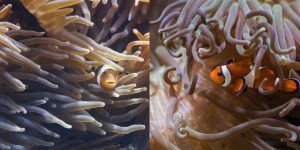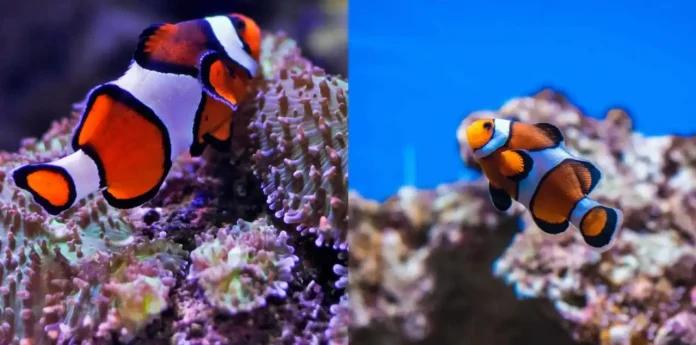Clownfish are small, brightly colored fish. They have captured the hearts of many aquarium enthusiasts. These fish are famous for their vibrant colors and playful personalities, but many wonder, do clown fish sleep? Do they? Let’s explore the uniqueness of this extraordinary sea creature.
Do clown fish sleep? Or are they trying to trick us?
The answer is yes, clownfish sleep, but their sleeping habits differ from humans and most other fish. How Do Clownfish Sleep? When it comes to how clownfish sleep, they have a unique sleeping pattern closely tied to their relationship with anemones. Clownfish typically sleep inside the anemone that they call home.
What are Anemones? Anemones are famous for their stinging tentacles. Anemones provide a safe haven for clownfish, protecting them from predators and other dangers lurking in the open water. Clownfish have a special coating on their skin that allows them to avoid the anemone’s stinging tentacles. It will enable them to sleep safely inside.

Clownfish Sleeping Behavior
Clownfish are diurnal creatures, meaning they sleep at night and are active throughout the day. During the day, clownfish swim around their habitat, interact with other fish, and feed. At night, they retreat to their anemone and enter a state of rest. While in this state, their metabolism slows down, and their body movements become slower. They do not have eyelids, so they cannot close their eyes. Instead, they rest and conserve energy while remaining alert to potential danger.
Researchers have observed that clownfish go into a state of rest during which they become less active, hide in the anemone or a crevice, and are less responsive to stimuli. During their resting period, clownfish often lie on their sides, which allows them to conserve energy and avoid predators. They may also retract their dorsal fins and remain still for extended periods.
How can you help as an owner of clown fish to sleep well?
You should provide a safe and comfortable environment for clownfish to sleep in. A suitable anemone for clownfish to call home, as well as ensuring that the water quality in their aquarium is appropriate. Stress and sickness may result from unclean water, disrupting a clownfish’s sleeping habits.

Clownfish sleep time
When Do Clownfish Sleep? Clownfish typically sleep at night. This is because the darkness of the night signals to them that it is time to rest. However, they may also take naps throughout the day. These naps are typically shorter than their nighttime rest periods, allowing them to recharge before returning to their daytime activities.
The timing of clownfish sleep varies depending on their location and the presence of predators. In areas with high predation, clownfish may snooze during the day to avoid being consumed by larger fish. In areas with fewer predators, clownfish may sleep at night.
Can clownfish sleep without anemones?
Technically clownfish can sleep without anemones. But they prefer to sleep inside them. Anemones provide a sense of security and safety that helps clownfish to relax and enter a state of rest. If kept in an aquarium without anemones, they may still sleep but not get the same quality of rest as they would with anemones present.

Conclusion
Do clown fish sleep? Yes, they do sleep, and their sleeping behavior is closely tied to their relationship with anemones. They typically sleep at night but may also take naps throughout the day. Anemones provide a safe and secure environment for clownfish to sleep in, which helps them to recharge and stay healthy.
When clownfish sleep, they enter a state of rest where their metabolism slows down, and their body movements become slower. By providing a safe and comfortable environment for clownfish to sleep in, you can help ensure that they thrive in your aquarium.

